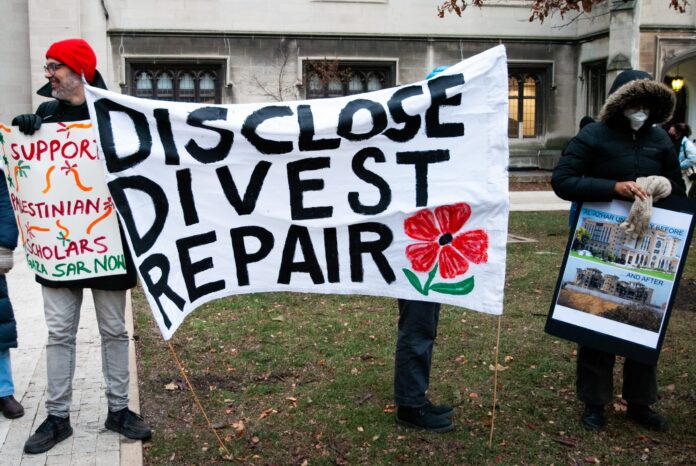About one hundred demonstrators gathered in the bitter cold on Tuesday to protest the University of Chicago’s perceived failure in upholding its promise to launch a Gaza Scholars at Risk initiative that would invite Palestinian academics to campus.
UChicago Alumni for Palestine and the school’s chapter of Faculty and Staff for Justice in Palestine (FSJP) organized the protest outside Stuart Hall, where President Paul Alivisatos and Provost Katherine Baicker were meeting with faculty members for the monthly Council of the University Senate meeting. At one point, half the demonstrators went inside the building with signs, lined the halls, and stood silently.
Protesters outside performed protest songs and chanted, “U. Chicago, shame on you! There is blood on your hands too!” and, “Stop the war and occupation! Money for jobs and education!”
The pledge to host Palestinian professors and researchers was a result of negotiations between the university administration and student protesters participating in a Palestine solidarity encampment this past spring. But according to Uday Jain, a postdoctoral social sciences teaching fellow and organizer with FSJP, there has been “radio silence” from the administration since the summer. Judain said the university and faculty exchanged some emails, but “nothing concrete” has materialized.
“It’s a violation on two fronts,” said Callie Maidhof, a global studies professor who researches settlers in the West Bank. “It’s a serious violation of the trust of the students, and it’s part of a pattern of the university administration not following through on these types of matters.”
The university’s existing Scholars at Risk program offers one-year teaching and research positions to up to two scholars as a respite from conflict or direct threats to their lives. They receive a salary and benefits, as well as logistical assistance with visas and housing. Only nonvisiting faculty members are able to nominate scholars for the program.
According to emails revealed by WBEZ, in May, Baicker promised an unnamed faculty member that, in addition to the existing program, the university would launch a “Gaza Scholars at Risk” program that would host up to eight scholars from Gaza for one-year terms with an option for renewal, focusing “specifically [on] those facing direct risk in the form of threat of arrest/imprisonment and/or general physical risk from an active conflict.” A faculty committee with regional expertise, appointed by the provost, would identify and support applicants.

Jeremy Manier, a spokesperson for the University of Chicago, said in a statement to the Reader that the Scholars at Risk program has been “mischaracterized” and “remains focused on supporting scholars at risk and upholding the University’s commitment to academic freedom.”
Manier affirmed the university’s public intent to hire eight academics “from the region impacted by the conflict in Gaza” through the existing Scholars at Risk program and indicated that one is now on campus and will begin teaching in January. (A faculty member participating in the protest confirmed that one professor from the West Bank has arrived through the program.) Manier also said that faculty members “with expertise in the region” have already been enlisted to work with the existing Scholars at Risk faculty committee.
For eight days this spring, hundreds of U. Chicago students pitched tents on the main quad, in an encampment they called the Popular University for Gaza, in solidarity with Palestinians experiencing genocide in Gaza. Negotiations with the administration broke down and the university police department forcibly cleared the encampment on May 7, with Alivisatos charging that it “interfered with the free expression, learning, and work of others.” Students formed similar encampments at Northwestern, DePaul, the School of the Art Institute of Chicago, and Columbia College Chicago that called for the universities to divest from Israel and weapons manufacturers, among other demands.
Organizers say U. Chicago has retaliated against protected speech by evicting an Arab student from his dorm for participating in a demonstration and by withholding degrees from five students (they later received their degrees). Another group of students with the pro-Palestine coalition UChicago United alleges that the university fostered a “nearly yearlong, hostile environment of anti-Palestinian racism,” including violence, harassment, and police surveillance, and has filed a Title VI complaint with the U.S. Department of Education’s Office for Civil Rights.
The university “would rather repress protests and evict its own students than confront its own role in one of the greatest crimes against humanity perpetrated by both the U.S. government and the Israeli state,” said Jain.
According to the Palestinian Ministry of Health, more than 44,000 Palestinians have been killed in Gaza since October 7, 2023, with no ceasefire in sight. As of April, the United Nations (UN) said that 80 percent of schools in Gaza were either damaged or destroyed in “an intentional effort to comprehensively destroy the Palestinian education system, an action known as ‘scholasticide.’” Every university in Gaza was destroyed in the first 100 days of the war.
“Politics or not, if one university is attacked, let alone every single university destroyed in a place like Gaza, we are also not safe here,” said Maidhof. “We’re talking about what the UN calls scholasticide. The university administration won’t even say that word.”





